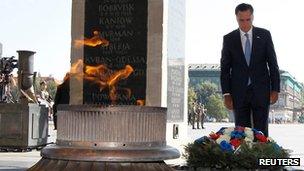Frustration grows between Romney camp and journalists
- Published
- comments

Mitt Romney's press secretary snapped at a journalist during a memorial visit in Warsaw
As Mitt Romney's foreign tour ended, he addressed an audience in Warsaw.
"It's been a trip to three places far apart on the map. But for an American, you can't get much closer to the ideals and convictions of my own country," read a pre-delivery copy of his speech.
"Our nations belong to the great fellowship of democracies. We speak the same language of freedom and justice. We uphold the right of every person to live in peace."
But those are not the words that the reporters on the tour are talking about.
When questions about Monday's remarks on Palestinian culture and the economy were shouted at the Tomb of the Unknown Soldier in Warsaw, the Romney press secretary told one journalist: "Kiss my ass, this is a holy site."
He's apologised since. But it shows the levels of frustration.
Firstly from the Republican team, that the tour has been dominated by the reporting of a series of apparent missteps by Mr Romney.
Secondly from the media, that Mr Romney won't answer any questions and that even his press team finds it difficult to respond to the most basic inquiries about what their candidate has said.
You could argue that what has been described as gaffes is in fact plain-speaking that fit well with his general narrative of taking a tougher line than Obama. You could - but his team haven't tried to do so.
Dangerous world
But the speech itself was very much on message, a warning that the world is a dangerous place. Mr Romney said:
"The Arab world is undergoing a historic upheaval, one that holds promise, but also risk and uncertainty.
"A ruthless dictator in Syria has killed thousands of his own people. In Latin America, Hugo Chavez leads a movement characterised by authoritarianism and repression.
"Nations in Africa are fighting to resist the threat of violent radical jihadism. And in Russia, once-promising advances toward a free and open society have faltered."
And he urged a troubled Europe to look to Poland:
"Rather than heeding the false promise of a government-dominated economy, Poland sought to stimulate innovation, attract investment, expand trade and live within its means.
"Your success today is a reminder that the principles of free enterprise can propel an economy and transform a society."
But what the networks will be talking about is more likely the frustration of Romney's team than the example set by one European country.